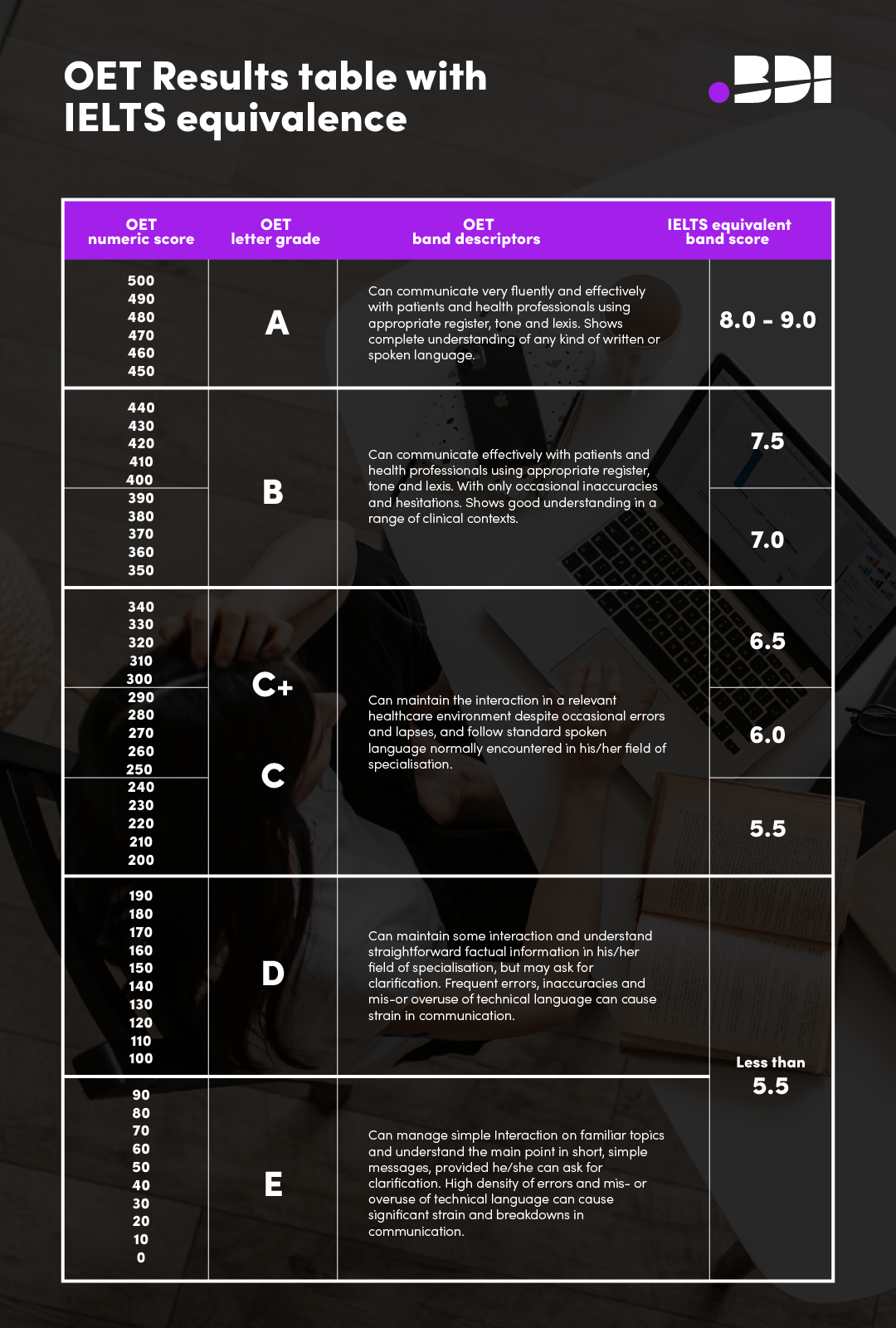OET Preparation for GMC Registration
08 Mar, 202310 Minutes
OET is an English language exam commonly used by IMGs because the GMC accepts it for GMC registration. The exam itself is desirable for its focus on healthcare. When taking the OET, you don’t have to cover all topics in the English language; instead, you can focus on your profession. That makes preparation a little easier for IMGs.
A Brief Overview of OET
The occupational test is a workplace-specific English language exam that tests your ability to communicate and understand English in a clinical setting. It tests your reading, writing, speaking, and listening skills, with each having a section of their own in the exam. To qualify for GMC registration with OET, you need a minimum grade B for each section.
The following table shows the OET scoring system alongside the equivalent levels for the IELTS test:

Booking OET
The OET costs an average of £329 in the UK and occurs worldwide at least once a month. You can book your place on the OET website, where you can fill out the online form before reviewing your selected location and time. You’ll also need to provide your profession, which is especially crucial as the OET test will be tailored toward this! At the end, you will pay for and finalise your booking.
How to Prepare for OET
Booking the OET test is easy – the hard part comes from preparing. Here are our tips for passing OET the first time.
Get to Know the Test Structure
Knowing what to expect from the exam’s structure is critical, as it will tell you what to study. It will also ensure you’re prepared for what’s to come on the day. Here’s a brief overview of the OET test structure:
Reading
The reading section lasts 60 minutes with 42 questions, which are all on random healthcare topics.
Writing
You’ll be expected to write a letter related to your profession, such as a referral. You get 45 minutes for this.
Listening
You’ll listen to various recordings, all focusing on healthcare topics. For example, some might be client-patient conversations. To answer, you’ll either take professional notes or answer multiple-choice questions.
Speaking
The speaking part of the OET test involves two roleplays. You’ll warm up with a conversation first; then, the assessor will provide a roleplay card. This part takes 20 minutes.
Knowing what to expect will help you practice and prepare to perform your best on the day.
Do Practice Papers
A great way to get familiar with the exam pattern is to do practice papers of the OET. Doing these will also help you understand your strengths and weakness in the English language. When looking at your score, you will see whether you need more practice in speaking, writing, reading, or listening.
Knowing your weaknesses is particularly important. Determine which healthcare-related topics you need to spruce up your English knowledge on. Also, determine whether you’re a better reader, writer, listener, or speaker. It helps to dedicate more time to the areas you’re weaker in. It’s all about efficient study!
Read High-quality Referral Letters
To practice for the writing section, read and analyse a range of high-quality referral letters. When doing so, notice the grammar, sentence structure, and paragraph structure. If there are any words you don’t know, write them down and learn them.
Listen to Healthcare Podcasts/Videos
You want to familiarise yourself with both healthcare knowledge and the English language. One of the best ways to manage this – mainly to nail the listening section of the OET – is to listen to healthcare podcasts or videos on the go. You can even do this while multitasking, making studying a natural part of your day.
One of the best kinds of videos to listen to is medical lectures, which you can find many of on YouTube.
Use the OET Preparation Portal
The OET preparation portal is an excellent place to pick up various study materials, including study tips and guides. You can even find an OET tutor there, which will significantly help the preparation process. They also have the OET pulse, which is an excellent way to see your current English language skills, so consider taking that.
Use a Range of Study Sources
Don’t just stick to one book or one type of video; digest a wide range of studying sources, including magazines, newspaper articles, videos, podcasts, medical articles, and more! In particular, read and listen to information on your profession, as that is the topic you need to know most about.
Practice Role Play
In the test, you will be expected to participate in a clinical roleplay where you’ll speak in English. During this section, you need to do more than recite memorised phrases. To get a good grade, you need the conversation to be flowing and fluent.
A great way to ensure you sound natural in English is to practice roleplaying – preferably with a person who knows how to speak English. The more frequently you practice, the more you will improve.
Make Study Part of Your Day-to-Day Life
For however long you dedicate to preparing for the OET exam, make studying a part of your routine. Here’s an example of how you can fit study into your day in a natural way:
Morning
Begin your morning by reading a daily science article that’s focused on your medical profession.
Commuting
When commuting in the morning or afternoon, listen to an English lecture or podcast, with the topic once again being your profession (or healthcare in general).
Afternoon
Fit an afternoon study session into your day. During this time, write a paragraph about what you’ve learned so far that day from the daily science article and podcast/lecture. Use this as an opportunity to practice your grammar and sentence structure.
End of the Day
Before you sleep, speak aloud to yourself (or someone you live with), going over what you’ve done that day regarding clinical experience and learning. Consider even hitting ‘record’ so you can listen back to how you sound and notice where improvements might need to be made with your English-speaking skills.
This structure will help you fit OET study even into a busy day. Of course, don’t forget to also include some longer study sessions when you have time.
What Happens If You Fail?
Failing is understandably annoying, but it’s not the end of the world – you have limitless attempts at the OET, so you can always book and try again. Just remember to study a lot before trying to next time, focusing particularly on the sections where you didn’t make the B grade.
In Summary
The OET exam requires a lot of prep for a B grade. By using our tips above, you are far more likely to pass the first time, allowing you to get GMC registered and start the process of moving to the UK and working in the NHS!
If you’re considering a career in the NHS the get in touch and we’ll be happy to provide you with guidance, support and all the latest job vacancies from the UK.


